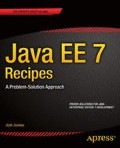Abstract
Java Web Services can play a vital role in enterprise application development. A web service can be described as a client and server application that communicates over HTTP, which provides a standard means for communication and interoperability between different applications. There are many different web service implementations available across each of the different programming platforms. A web service is made accessible via an endpoint implementation. Clients and servers transmit messages to exchange information between various web services. Entire applications can be implemented using web services that transmit messages and data to and from each other. The two main web service implementations that are part of Java EE 7 are the Java API for XML Web Services (JAX-WS) and the Java API for RESTful Web Services (JAX-RS).
Access this chapter
Tax calculation will be finalised at checkout
Purchases are for personal use only
Author information
Authors and Affiliations
Rights and permissions
Copyright information
© 2013 Josh Juneau
About this chapter
Cite this chapter
Juneau, J. (2013). Java Web Services. In: Java EE 7 Recipes. Apress, Berkeley, CA. https://doi.org/10.1007/978-1-4302-4426-4_15
Download citation
DOI: https://doi.org/10.1007/978-1-4302-4426-4_15
Published:
Publisher Name: Apress, Berkeley, CA
Print ISBN: 978-1-4302-4425-7
Online ISBN: 978-1-4302-4426-4
eBook Packages: Professional and Applied ComputingApress Access BooksProfessional and Applied Computing (R0)

